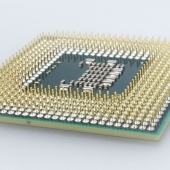-
New Spectre v2 attack impacts Linux systems on Intel CPUs
Researchers have demonstrated the "first native Spectre v2 exploit" for a new speculative execution side-channel flaw that impacts Linux systems running on many modern Intel processors.
- April 10, 2024
- 01:19 PM
 2
2
-
New Retbleed speculative execution CPU attack bypasses Retpoline fixes
Security researchers have discovered a new speculative execution attack called Retbleed that affects processors from both Intel and AMD and could be used to extract sensitive information.
- July 14, 2022
- 03:13 AM
 0
0
-
Intel, AMD, Arm warn of new speculative execution CPU bugs
Security researchers have found new a new way to bypass existing hardware-based defenses for speculative execution in modern computer processors from Intel, AMD, and ARM.
- March 09, 2022
- 12:03 PM
 3
3
-
Google shares Spectre PoC targeting browser JavaScript engines
Google has published JavaScript proof-of-concept (PoC) code to demonstrate the practicality of using Spectre exploits targeting web browsers to gain access to information from a browser's memory.
- March 12, 2021
- 02:30 PM
 0
0
-
Working Windows and Linux Spectre exploits found on VirusTotal
Working exploits targeting Linux and Windows systems not patched against a three-year-old vulnerability dubbed Spectre were found by security researcher Julien Voisin on VirusTotal.
- March 01, 2021
- 06:05 PM
 0
0
-
Windows 10 Spectre 2 Mitigation Now Uses Retpoline By Default
If you currently have mitigations enabled for the Spectre Variant 2 (CVE-2017-5715) vulnerability, Microsoft has now enabled the Retpoline Spectre mitigation feature by default in Windows 10 version 1809 (October 2018 Update) for better performance.
- May 15, 2019
- 04:01 AM
 2
2
-
Boost Windows 10 Performance with Retpoline Spectre Mitigation
If you are using older Intel processors or AMD processors, you can boost the performance of Windows 10 by enabling the Retpoline Spectre mitigations that were recently ported to Windows 10 October 2018 Update build 1809.
- March 05, 2019
- 10:48 AM
 17
17
-
Windows 10 Update KB4482887 Released With Performance Fix for Spectre Bug
Microsoft has released the Windows 10 KB4482887 cumulative update for build 1809 that includes numerous fixes including Retpoline Spectre mitigation, a fix for an annoying Action Center bug, and numerous other bug fixes.
- March 03, 2019
- 12:36 PM
 0
0
-
Linux Kernel Spectre Protection Changes to Boost App Performance
The Speculative Store Bypass Disable (SSBD) bit will be toggled off for programs that do not require the extra protection against the Spectre Variant 4 hardware security issue according to a proposed Linux kernel patch
- January 31, 2019
- 12:23 PM
 0
0
-
The Intel Microcode Boot Loader Protects Older CPUs From Spectre
The Intel Microcode Boot Loader creates a bootable USB flash drive that automatically applies the latest Intel microcodes to your identified CPU so that you are protected from the speculative execution side-channel attacks called Spectre.
- November 12, 2018
- 06:34 PM
 2
2
-
Spectre and Meltdown Hardware Protection Added to Intel's 9th Gen CPUs
As part of today's Intel's Fall Desktop Launch event, new 9th generation CPUs were announced that include hardware protection for two of the Spectre and Meltdown vulnerability variants.
- October 08, 2018
- 11:42 AM
 2
2
-
Intel 2018 Desktop Launch Tomorrow, 9th Gen CPUs Expected
Intel has announced that they are live streaming their 2018 Desktop Launch Tomorrow at 10am EST via the Intel Newsroom. The details are vague other than that they are announcing the "latest PC performance developments from Intel."
- October 07, 2018
- 02:20 PM
 0
0
-
Windows 10 KB4100347 Intel CPU Update Causing Boot Issues & Pushed to AMD Users
On August 21st, Microsoft released an update to the May KB4100347 Intel microcodes for Windows 10 & Windows Server 2016. After installing this latest version, Windows users are reporting that they are unable to boot Windows 10 or are having performance issues. To complicate the issue, the Intel CPU update is being pushed to AMD users
- August 27, 2018
- 03:35 PM
 4
4
-
Microsoft Rolls Out New Intel Microcode for Windows 10, Server 2016
Microsoft has released multiple microcode updates that mitigate additional variants of the speculative code execution vulnerabilities discovered in Intel processors. The patches cover the recently disclosed CPU flaws generically referred to as Foreshadow or L1 Terminal Fault.
- August 22, 2018
- 07:03 PM
 0
0
-
Researchers Disclose New Foreshadow (L1TF) Vulnerabilities Affecting Intel CPUs
Academics and private sector researchers have revealed details today about three new vulnerabilities affecting Intel CPUs.
- August 14, 2018
- 02:28 PM
 0
0
-
New NetSpectre Attack Can Steal CPU Secrets via Network Connections
Scientists have published a paper today detailing a new Spectre-class CPU attack that can be carried out via network connections and does not require the attacker to host code on a targeted machine.
- July 27, 2018
- 04:32 AM
 0
0
-
Researchers Detail New CPU Side-Channel Attack Named SpectreRSB
Academics from the University of California, Riverside (UCR) have published details last week about a new Spectre-class attack that they call SpectreRSB.
- July 23, 2018
- 12:18 PM
 2
2
-
Academics Announce New Protections Against Spectre and Rowhammer Attacks
Academics from multiple universities have announced fixes for two severe security flaws known as Spectre and Rowhammer.
- July 23, 2018
- 04:55 AM
 0
0
-
Google Enables "Site Isolation" Feature for 99% of Chrome Desktop Users
Google has secretly enabled a security feature called Site Isolation for 99% of its desktop users on Windows, Mac, Linux, and Chrome OS. This happened in Chrome 67, released at the end of May.
- July 11, 2018
- 06:33 PM
 2
2
-
New Spectre 1.1 and Spectre 1.2 CPU Flaws Disclosed
Two security researchers have revealed details about two new Spectre-class vulnerabilities, which they've named Spectre 1.1 and Spectre 1.2.
- July 11, 2018
- 06:44 AM
 2
2
 0
0





















